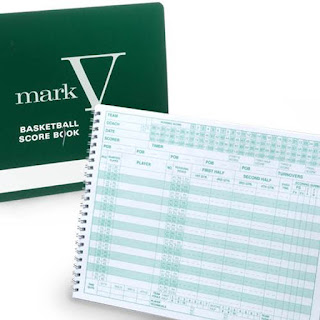The Essential Guide To Using A Basketball Scorebook For Every Game
Basketball Scorebook: Keeping Track of the Action
Basketball is a fast-paced and exhilarating sport, loved by millions around the world. Whether you're a coach, player, or die-hard fan, keeping an accurate record of the game is crucial. That's where the basketball scorebook comes into play.
In this comprehensive guide, we'll delve into the importance of a Basketball Scorebook, how to use it effectively, and why it's an invaluable tool for everyone involved in the game. Whether you're a seasoned coach or a parent cheering from the stands, understanding the scorebook is key to enhancing your basketball experience.
What Is a Basketball Scorebook?
A basketball scorebook is a specially designed record-keeping tool that allows you to track every detail of a basketball game. It's essentially a booklet with pre-formatted pages for recording player statistics, team scores, and other essential game information. These scorebooks come in various formats, but the most common ones are designed for high school, college, and professional basketball games.
Why Is a Basketball Scorebook Important?
- Official Record Keeping: The scorebook serves as the official record of the game, documenting each player's points, rebounds, assists, and other key stats. This information is crucial for referees, coaches, and league officials.
- Player Development: Coaches use the data recorded in the scorebook to analyze player performance, identify strengths and weaknesses, and make informed decisions about strategy and player development.
- Historical Reference: Scorebooks provide a historical record of a team's performance over the course of a season or multiple seasons. They are invaluable for tracking trends and measuring progress.
- Game Analysis: Fans and analysts can use the scorebook to dissect the game, assess player contributions, and gain a deeper understanding of the team's performance.
How to Use a Basketball Scorebook
Using a Basketball Scorebook effectively requires attention to detail and a basic understanding of the game's rules and statistics. Here's a step-by-step guide to help you get started:
1. Pre-Game Preparation
Before the game begins, ensure you have the following:
- A basketball scorebook with blank pages.
- Writing utensils, such as pens or pencils.
- Roster information for both teams, including player names and jersey numbers.
- Familiarity with basketball scoring rules and statistics.
2. Record Player Information
In the scorebook, record the player names, jersey numbers, and positions for both teams. Make sure the information is accurate and matches the players on the court.
3. Track the Game
As the game unfolds, use the scorebook to:
- Record each team's starting lineup.
- Note the time and score at the beginning of the game.
- Record each field goal made, including the player who scored and the type of shot (two-pointer or three-pointer).
- Track free throws attempted and made.
- Record assists, rebounds, steals, blocks, and turnovers for each player.
- Note any fouls committed by players.
4. Maintain Accuracy
Accuracy is paramount when using a scorebook. Double-check the information you record, and communicate with fellow scorekeepers to ensure consistency in tracking the game.
5. Halftime and End-of-Game Summaries
At halftime and the end of the game, provide summaries of the following:
- Team scores.
- Individual player statistics, including points scored, rebounds, assists, and fouls.
- Notable events during the game.
6. Post-Game Review
After the game, review the scorebook to spot any errors or discrepancies. Make corrections if necessary, as the scorebook's accuracy is crucial for official records.
Common Basketball Scorebook Formats
There are different scorebook formats available, each catering to specific levels of play and preferences. Some of the most common formats include:
- High School Scorebooks: These scorebooks are designed for high school basketball games, featuring pre-formatted pages for recording high school-specific statistics.
- College Scorebooks: College basketball scorebooks are similar to high school scorebooks but may include additional sections for recording more advanced statistics.
- Professional Scorebooks: Designed for professional and elite-level games, these scorebooks often have more detailed stat-tracking capabilities.
- Custom Scorebooks: Some teams and organizations opt for custom scorebooks that can be tailored to their specific needs and branding.
In the world of basketball, the scorebook is an indispensable tool that captures the essence of the game. Whether you're a coach striving for victory, a player aiming to improve, or a devoted fan seeking a deeper connection to the sport, mastering the art of scorekeeping is a valuable skill. So, the next time you watch or participate in a basketball game, appreciate the power and significance of the unassuming scorebook that keeps the heart of the game beating.



Comments
Post a Comment